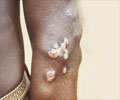Severity of most infectious diseases such as polio, measles, tuberculosis, typhoid, HIV, and meningococcal meningitis was higher among young adults than among school-age children, finds a new study.

The study examined 32 distinct infectious diseases, 13 bacterial and 19 viral, looking for patterns in severity at various ages using case fatality and hospitalization rates.
The infectious disease severity was found to be at its lowest in school-age kids. Strikingly, the severity was greater among young adults in their 20s compared to school-age kids for many diseases, including polio, measles, tuberculosis, typhoid, HIV, and meningococcal meningitis.
These findings imply that 'immune aging' may begin much earlier than earlier thought, with the rise in the severity of several infectious diseases after childhood apparent by the age of 20 years. The experts say these results could have major hints for understanding resilience to infection, optimal vaccine scheduling, drug design, and health protection policies over the life course.
Further investigation is needed into the mechanisms of immune aging, and how school-age kids are better able to resist infections, in order to inform new approaches to drug or vaccine design. Understanding the various resilience of kids and adults to infections should guide policies, including vaccine schedules and the role of school closures.
Advertisement















